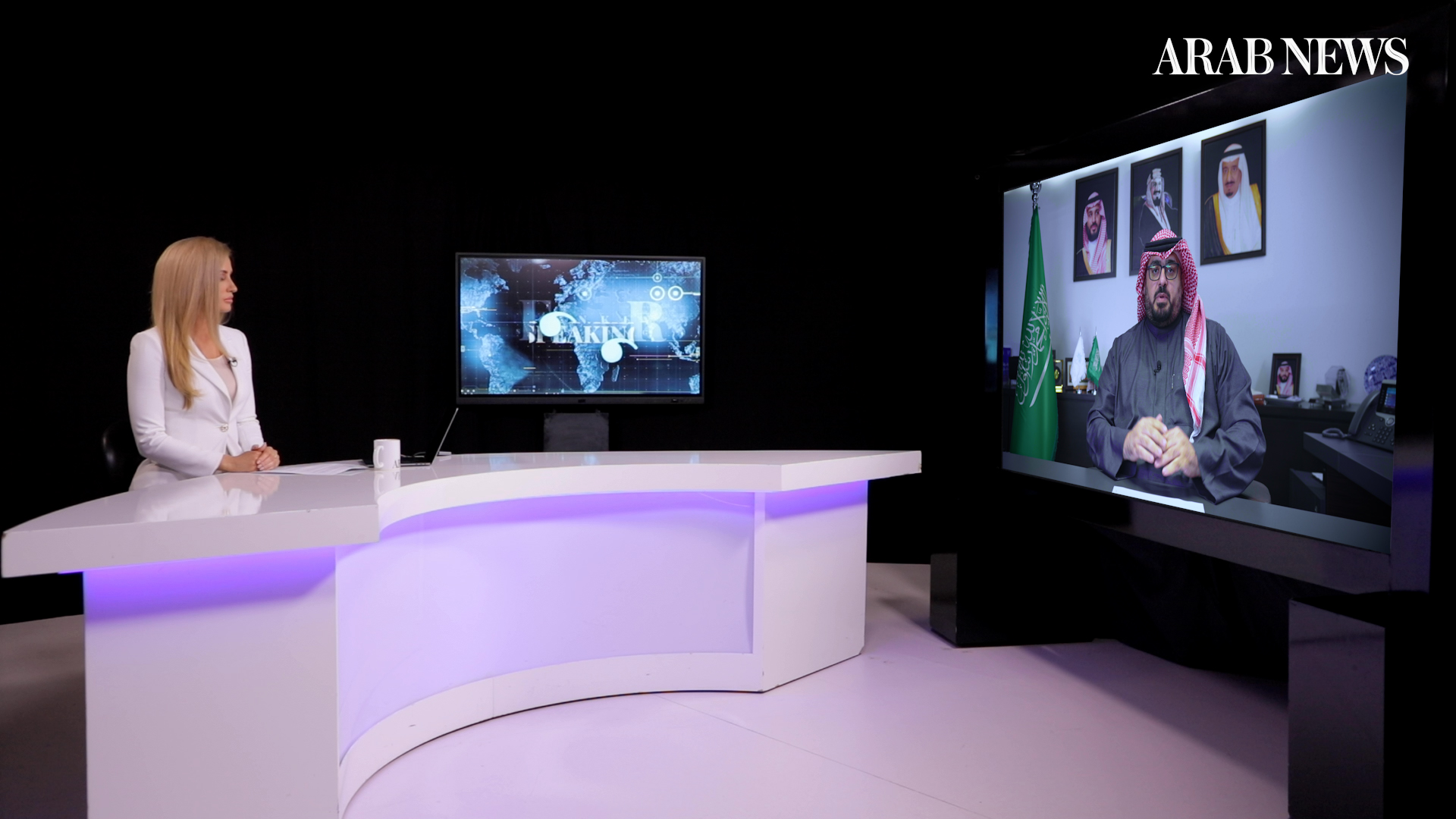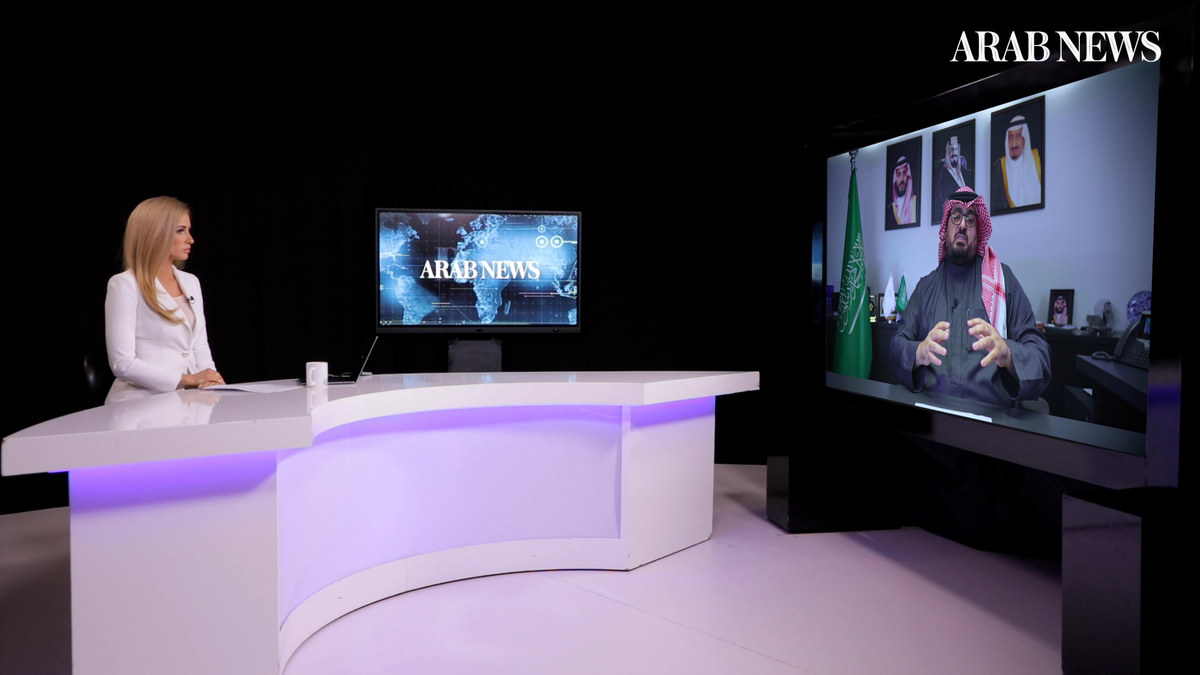DAVOS, Switzerland: As the world’s heads of government, top executives and tech gurus make their way to the World Economic Forum’s annual meeting in the snow-covered Swiss alpine town of Davos, one thing is certain: Everyone is eying Saudi Arabia.
“Without a doubt, Saudi Arabia has demonstrated that it is the global growth story, and in the past seven years, we’ve witnessed not only commitment to this transformation, but also delivery on this transformation,” Faisal Alibrahim, the Kingdom’s minister of economy and planning, said on Arab News’ “Frankly Speaking” ahead of the summit, which is returning to its winter slot.
Appearing on the flagship current affairs talkshow, he said: “There are many more pieces of evidence that show that Saudi Arabia is an attractive investment location for current partners, but also future ones as well.”
Besides Alibrahim, the high-level Saudi delegation to the Davos summit includes Princess Reema bint Bandar Al-Saud, the ambassador to the US; Foreign Minister Prince Faisal bin Farhan; Minister of State for Foreign Affairs Adel Al-Jubeir; Minister of Investment Khalid Al-Falih; Minister of Finance Mohammed Al-Jadaan; Minister of Communication and Information Technology Abdullah Al-Swaha; Minister of Industry and Mineral Resources Bandar Al-Khorayef; and Fahd Al-Rasheed, CEO of the Royal Commission for Riyadh City.

Faisal Alibrahim, Saudi Arabia’s minister of economy and planning, speaking to Arab News’ “Frankly Speaking.” (AN Photo)
“There’s a lot of value in sharing our story and what we’ve learned,” Alibrahim told “Frankly Speaking” host Katie Jensen, adding that “there is a lot of value from engagement, and we are focusing not only on engagement, but also on the concrete steps that come out of it.
“There’s a lot that we can contribute, but also there’s a lot that we can gain and benefit from being there, keeping our finger on the pulse of all global issues that may impact our transformation or ones that our transformation can contribute to.”
A Kingdom-focused panel discussion titled “Saudi Arabia’s Transformation in the Changing Global Context” will be held at one of the forum’s main stages, while Alibrahim’s main session, “Between Liquidity and Fragility: Reforming in MENA,” will take place on Jan. 19.
Alibrahim, 41, took on his ministerial role in 2021 under King Salman — with a large array of ambitious giga-projects that fall under his and his colleagues’ purview.
Six years ago, then Deputy Crown Prince Mohammed bin Salman unveiled Vision 2030, a strategic plan designed to transform Saudi Arabia from an oil-dependent and conservative Kingdom into a youthful, tourist-attracting mega hub for tech, investment and entertainment.
Alibrahim dismissed criticism that some of the plans are overly ambitious, saying: “Of course there will be criticism, but in the end people need to keep in mind that this is something that was never attempted before. But we are very confident that it will succeed.”

Alibrahim took on his ministerial role in 2021 under King Salman — with a large array of ambitious giga-projects that fall under his and his colleagues’ purview. (AN Photo)
He added: “Most of these projects are projects that are there to anchor the growth of sectors or to crowd in more private-sector investments into them. They are calculated (and) ambitious, but a very calculated approach.
“Naturally, as projects go into development, there is a continuous progress and a continuous assessment of things that need to change. Despite that, we feel 100 percent sure that these timelines are achievable. Some of these projects are more ambitious than others, and we’re very bullish on achieving them.”
Alibrahim said that the projects will not only contribute to the Kingdom’s economic productivity, but will also “have a trickle-down effect on global challenges and innovation opportunities globally.”
With that, he sees a wealth of top thinkers, researchers and developers setting up shop in the Kingdom. However, Alibrahim did note that such projects and plans do also come with a host of obstacles.
“The main challenges we face today are ones related to economic diversification. We need to diversify our sources of growth,” he said.
“We have done great in terms of increasing the pace at which our non-oil activities are increasing, but there’s still more room to grow in that regard, to the point where we can export a more diversified and more complex portfolio of exports that are competitive regionally and globally.”
Without a doubt, Saudi Arabia has demonstrated that it is the global growth story, and in the past seven years, we’ve witnessed not only commitment to this transformation, but also delivery on this transformation.
Faisal Alibrahim, Saudi minister of economy and planning
The second challenge, he said, is also an opportunity.
“We’re not an aging society — 60 per cent of our population is under the age of 30. At some point, they will grow, and at some point, we need to make sure that with that growth, we capture what experts call the ‘demographic dividend,’ which is the value that will be created by the Saudis and the people living in Saudi Arabia as they enter working age and as they enter the labor market.”
Finally, the third challenge concerns state and institutional capability, Alibrahim said.
He added: “We have grown a lot in the last seven years, but we are adamant that over the next eight to 10 — before 2030 — that the institutional capabilities of our government, especially on the economic and development side, reach a point where they are competitive and they are the global standard, especially because that has a huge impact on the quality of our policies and how fast and smart we respond to the changes around us.”

The minister told Katie Jensen that the Kingdom's young population is a key factor in shaping economic diversification. (AN Photo)
One of the ways Saudi Arabia is solidifying itself as a global player is by aiming to bring the World Economic Forum’s regional meeting to the Kingdom this year — a “Davos in the desert.”
Alibrahim said: “We have a clear agenda of our partnership opportunities (with WEF) and one of them is actually exploring a very focused forum in the Kingdom that will be Kingdom-based, that will tackle some of the global challenges. We are starting with one on an experimental basis in Davos, and we will take it from there.
“On top of that, we’ve been engaging more with the various initiatives that are championed by the World Economic Forum, and we are discussing launching new ones as well, which you might see in the near future.”
The last in-person Davos winter gathering was in 2020, just days before the COVID-19 outbreak was declared a global health emergency. The 2021 event was held virtually and last year’s summit was shifted from January to May after a spike in infections.
A record number of visitors and world leaders are expected to attend this year’s summit under the banner of “Cooperation in a Fragmented World.”
















